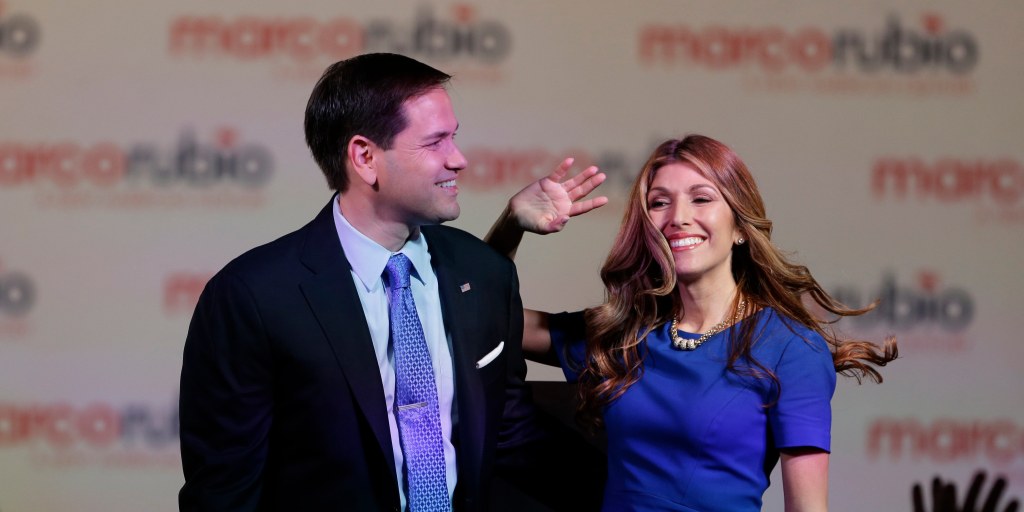
Marco Rubio tried to keep his composure, but emotion flickered in his eyes as he spoke about his wife, Jeanette. For years, the Florida senator has been known for his sharp political instincts, his quick debate skills, and his unwavering ambition — but on this day, standing before a small crowd in Miami, it wasn’t the politician who spoke. It was the husband, the father, the man who had built his life with someone who quietly carried much of the weight that came with it. His voice trembled as he looked down for a moment, then back up, and said softly, “She has been my anchor through every storm.”

It was an unusually raw confession from a man often seen as guarded. Rubio has spent more than two decades in public life, shaping policies, delivering speeches, and navigating the turbulence of Washington. But this was different. This wasn’t about party lines or political victories — it was about love, loyalty, and the unseen cost of a career that often takes more than it gives. “People see me on television, they hear my speeches,” he continued, “but what they don’t see are the nights she stayed awake, worrying, praying, holding everything together when I was hundreds of miles away.” The audience, once murmuring softly, fell silent.
Jeanette Rubio, a former Miami Dolphins cheerleader and the mother of their four children, has long avoided the spotlight, preferring to let her husband take the public stage. Yet, behind every campaign stop, every debate, and every late-night call, she has been the steady force grounding him. Rubio spoke of how, in the early days of his political career, they lived paycheck to paycheck, juggling bills and raising young children while he chased his dreams of public service. “There were times I questioned if it was worth it,” he admitted, “but she never did. She believed in me when I didn’t believe in myself.”
Those who have known Rubio personally say that Jeanette has always been the quiet counterbalance to his intensity. Her calm, measured demeanor contrasts sharply with the high-stakes world of politics that often threatens to consume everything in its path. Rubio described how, during the grueling 2016 presidential campaign — when his every move was scrutinized, mocked, or misinterpreted — it was Jeanette who shielded their family from the chaos. “There were days I’d come home and feel completely defeated,” he said, pausing, his voice growing thick. “And she’d remind me that our worth isn’t measured by polls or headlines, but by how we love and serve others.”

As he spoke, the crowd could sense that this was not a rehearsed moment or a crafted narrative for the cameras. There was vulnerability in his tone — the kind that can’t be faked. He recounted how Jeanette had once driven through a hurricane to bring their children to safety while he was stranded in Washington during a government shutdown. “I was on the phone with her, helpless,” he recalled. “And she just said, ‘Don’t worry, I’ve got this.’ That’s who she is. She’s always had this quiet strength, even when everything else is falling apart.”
For Rubio, the moment seemed to transcend politics. It was a reminder of what grounds him — a personal truth that no campaign slogan could capture. As he concluded, he looked out across the room, his voice steadying. “You know, in this line of work, you lose track of what matters sometimes,” he said. “But I’ve learned that no victory, no title, no election, will ever mean more to me than the woman who’s walked every mile beside me.”
The room was still. A few people shifted in their seats, visibly moved, unsure whether to applaud or remain silent out of respect for the intimacy of the moment. Then, slowly, the audience began to clap — not for the senator, but for the man who had just laid bare a piece of his heart.

Later, reporters would describe the speech as “unexpectedly human,” noting that it offered a glimpse of Rubio few had ever seen. But for those who were there, the headlines didn’t matter. What lingered was the image of a man — a husband — standing in quiet gratitude before the woman who had made every one of his triumphs possible. And though the cameras eventually turned off and the crowd dispersed, that silence, heavy and full of truth, remained — the kind that speaks louder than words.



